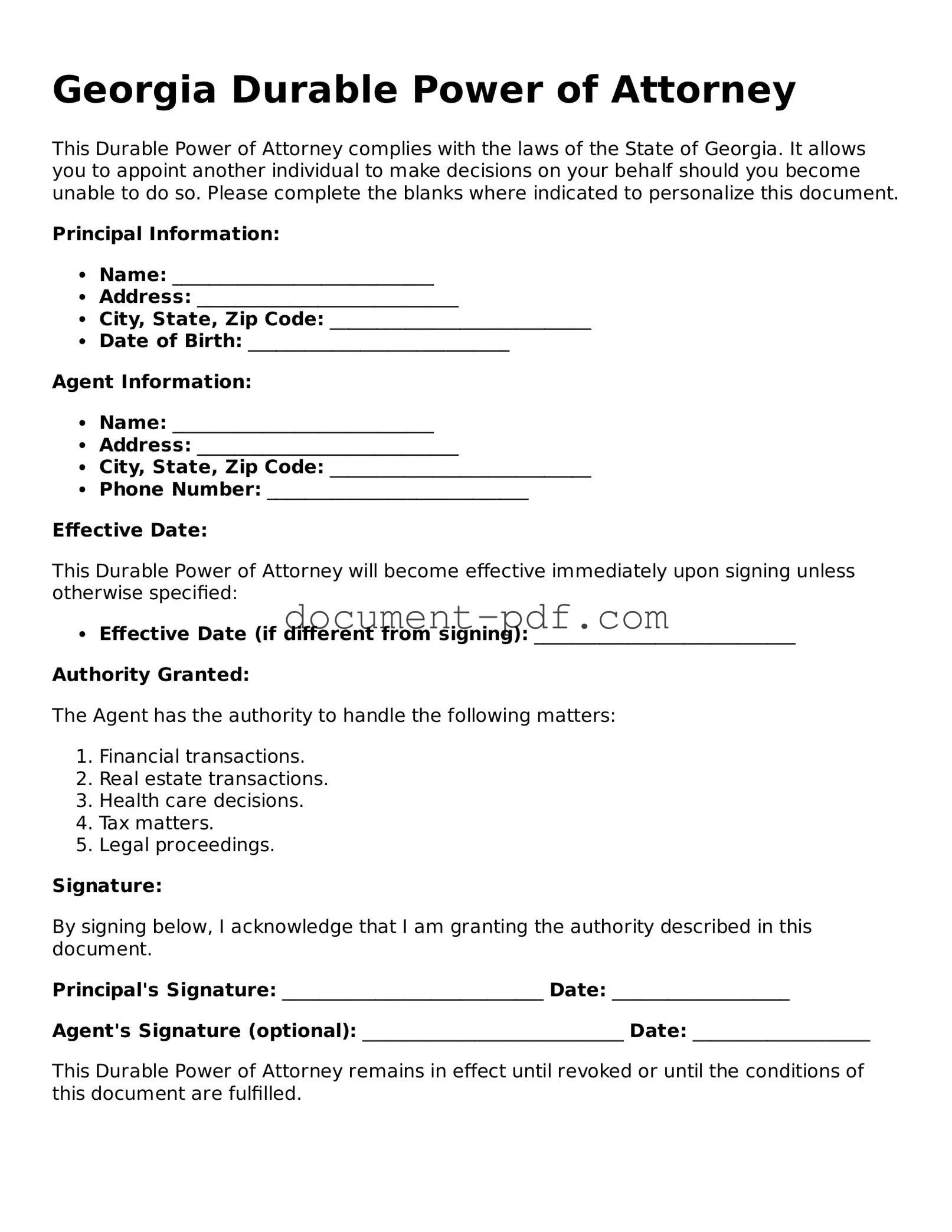The Georgia Durable Power of Attorney form is similar to the General Power of Attorney in that both documents allow an individual, known as the principal, to appoint someone else, called the agent, to make decisions on their behalf. The key difference lies in the durability aspect; while a General Power of Attorney may become invalid if the principal becomes incapacitated, a Durable Power of Attorney remains effective even in such circumstances. This distinction makes the Durable Power of Attorney particularly useful for long-term planning, especially for those concerned about potential future health issues.
Another document that shares similarities with the Durable Power of Attorney is the Healthcare Power of Attorney. This specific form empowers an agent to make medical decisions for the principal if they are unable to do so themselves. While the Durable Power of Attorney can cover financial and legal matters, the Healthcare Power of Attorney focuses solely on health-related decisions. Both documents emphasize the importance of appointing a trusted individual to act in the principal's best interests during times of incapacity.
The Living Will is another related document. While the Durable Power of Attorney allows for a broad range of decisions, a Living Will specifically addresses the principal's wishes regarding medical treatment in end-of-life situations. It serves as a guide for healthcare providers and loved ones, ensuring that the principal's preferences are honored. Although both documents are designed to facilitate decision-making during incapacity, the Living Will is limited to healthcare preferences, whereas the Durable Power of Attorney encompasses a wider scope of authority.
A Revocable Living Trust is also akin to the Durable Power of Attorney in that both can help manage an individual's affairs. A Revocable Living Trust allows a person to transfer assets into a trust, which can be managed by a trustee during their lifetime and distributed according to their wishes upon death. While the Durable Power of Attorney grants decision-making authority during the principal's lifetime, it does not involve asset transfer. Both documents aim to simplify the management of affairs and provide clarity in decision-making.
The Financial Power of Attorney shares characteristics with the Durable Power of Attorney, focusing specifically on financial matters. Like the Durable version, the Financial Power of Attorney allows an agent to handle the principal's financial decisions, such as managing bank accounts, paying bills, and filing taxes. The main distinction is that a Financial Power of Attorney may not remain effective if the principal becomes incapacitated unless it is explicitly designated as durable.
A Medical Directive, often confused with a Living Will, is another document that aligns closely with the Durable Power of Attorney. It outlines specific medical treatments that a person would or would not want in certain situations. While a Medical Directive provides guidance on treatment preferences, the Durable Power of Attorney designates someone to make those decisions on the principal's behalf. Both are essential for ensuring that healthcare decisions align with the individual's wishes.
For those navigating the intricacies of leasing agreements, it is crucial to have access to the appropriate documentation. The Texas Notice to Quit form is vital in this regard, as it officially notifies tenants about the necessary steps to vacate the rental property. Familiarity with this form not only aids landlords in the eviction process but also protects tenants' rights within the framework of Texas rental laws. For more resources on this documentation, consider visiting Texas PDF Templates.
The Guardianship document is another related legal instrument. A Guardianship is established through a court process when an individual is deemed incapable of making decisions for themselves. While the Durable Power of Attorney allows a person to choose their own agent, Guardianship involves a court appointing someone to make decisions for an incapacitated individual. Both serve to protect individuals who cannot manage their affairs, but they differ significantly in how the authority is granted and established.
Lastly, the Will can be seen as a companion document to the Durable Power of Attorney. A Will dictates how an individual's assets should be distributed after their death, while the Durable Power of Attorney governs decisions made during the individual's lifetime. Both documents are vital for comprehensive estate planning. They work together to ensure that an individual's wishes are respected both during their life and after their passing.

